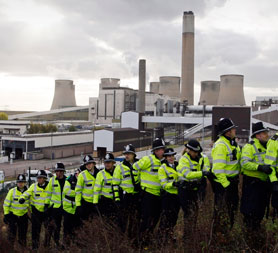IPCC called in over power station trial collapse
Nottinghamshire Police have invited the Independent Police Complaints Commission to investigate the collapse of the trial of six people accused of trying to shut down a coal-fired power station.
In a statement, Nottinghamshire Police said: “Nottinghamshire Police’s Chief Constable Julia Hodson has this evening invited the Independent Police Complaints Commission (IPCC) to conduct an investigation into the circumstances leading up to the collapse of the case.
“In addition, discussions are taking place with a number of bodies about commissioning a second review into the conduct of the undercover operation.”
The trial collapsed today amid claims that an undercover policeman who infiltrated the environmental group offered to give evidence on their behalf.
Six people were charged with trying to shut down the coal-fired Ratcliffe-on-Soar power station in Nottinghamshire in an environmental protest in 2009.
The case was due to be heard in court today but has collapsed after the officer reportedly contacted the defence team saying he was prepared to help.
The IPCC told Channel 4 News: “We understand that Nottinghamshire Police will be referring the case and the circumstances leading up to the collapse to the IPCC tomorrow morning, for us to consider whether to conduct an investigation.
“We will assess the matter when it is referred to us to decide what level of IPCC involvement is required in any investigation.”
The investigation is likely to look at the claims that the undercover police officer “switched sides”, although the Crown Prosecution Service (CPS) said the new information which led to the collapse of the trial was “not the existence of an undercover officer”.
Hundreds of activists were arrested when police raided the Iona School in Sneinton, Nottingham, on the morning of Easter Monday, April 13, last year.
The protesters planned to trespass at the coal-fired Ratcliffe-on-Soar power station and shut it down for a week, a trial at Nottingham Crown Court heard.
Living undercover
The undercover officer involved has been named as Pc Mark Kennedy, a former member of the Metropolitan Police who has spent the past seven years undercover in the environmental protest movement.
Kennedy is reported to have adopted ‘Mark Stone’ as a fake identity in 2003 where he began to infiltrate climate change groups. Kennedy’s real identity was discovered in October last year when he was confronted by friends.

He is said to have recently resigned from the police and moved abroad.
Some activists have claimed that his role went beyond that of a police observer and that he helped fund the protest and planned to take on a main role in disrupting the power station.
Mike Schwarz, a solicitor at the Bindmans law firm who represented the protesters, said: “I have no doubt that our attempts to get disclosure about Kennedy’s role has led to the collapse of the trial.
“It is no coincidence that, just 48 hours after we told the CPS our clients could not receive a fair trial unless they disclosed material about Kennedy, they halted the prosecution.
“Given that Kennedy was, until recently, willing to assist the defence, one has to ask if the police were facing up to the possibility their undercover agent had turned native.”
The CPS said in a statement: “Previously unavailable information that significantly undermined the prosecution’s case came to light on Wednesday, 5 January 2011.
“In light of this information, the Crown Prosecution Service reviewed the case and decided there was no longer sufficient evidence for a realistic prospect of conviction.
“There will be a hearing on Monday at which we will offer no evidence, thereby discontinuing the case.”
Protesters sentenced
Earlier this month 20 protesters were sentenced to a mixture of community orders and conditional discharges after they were convicted of conspiracy to commit aggravated trespass at Ratcliffe. The Met Police said it was “not prepared to discuss” Mr Kennedy.
Danny Chivers, a defendant in the collapsed second trial, added: “The pre-emptive arrest was controversial enough at the time, but we now know it was even worse than we realised.
“The police appear to have waited for the opportunity to arrest over 100 people, hold them for 24 hours, and take their DNA, before releasing them on to the streets of Nottingham in the middle of night with money and phones confiscated.
“Political protest of the kind being planned that day presents no risk to the public, yet the police consistently resort to the most extreme tactics they can muster. Hopefully the collapse of our trial will rule out the pre-emptive arrest of protesters for good.”
-
Latest news
-
Windrush scandal: returning to the UK after a forty year wait6m

-
Netanyahu ‘survival’ depends on ‘expanding war’ says head of Palestinian National Initiative5m

-
Proposed law change could strip parental rights from paedophiles5m

-
Hugh Grant settles privacy lawsuit against The Sun newspaper publisher2m

-
Post Office Scandal: what did top executive know?6m

-




